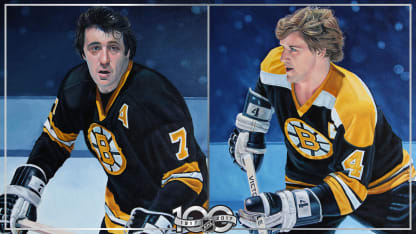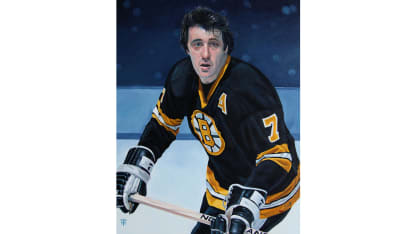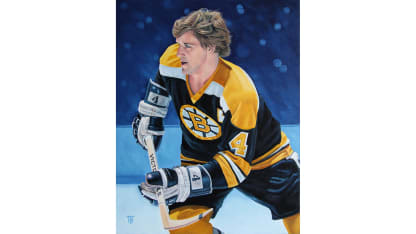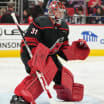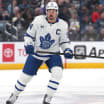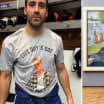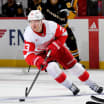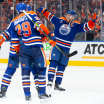Phil Esposito won the Stanley Cup twice with the Boston Bruins (1970, 1972) and finished his NHL career with 717 goals in 1,282 games with the Bruins, Chicago Blackhawks and New York Rangers.
In his
100 Greatest NHL Players profile of Esposito
, author Stu Hackel called the center "nearly unstoppable:"
"Phil Esposito was hockey's version of Willie Sutton, the prolific American bank robber," Hackel wrote. "Asked why he robbed banks, Sutton said, 'Because that's where the money is.' Why did Phil Esposito park his hulking frame in front of the opponent's net? Because that's where his goals were scored.
"A 6-foot-1, 215-pound, strong, gregarious man who seldom hid his emotions, Esposito was nearly unstoppable when he maneuvered in the slot. He'd find or fight for some free ice against the frustrated defenders trying to stop him, and figure out a way to get the puck on his stick. As soon as it was there, he sent it goalward."
Artist Tony Harris said when it came to Esposito, he wanted to capture a dominant part of his game.
"To me, the NHL in the 1970's was a very colorful era and Phil Esposito was at the head of the class. Esposito was fun to watch because he could score in so many different ways," Harris said. "I landed on this image of Phil charging the opposition net, no doubt ready to pop in the rebound! Remember, 'Jesus saves, Espo scores on the rebound.'"
Bobby Orr, considered the greatest defenseman in League history, won the Norris Trophy eight times. He and Esposito played together on the two Cup-winning teams.
In his
100 Greatest NHL Players profile of Orr
, NHL.com columnist Dave Stubbs put Orr in some pretty good company:
"The debate over the greatest player in NHL history will always be subjective," Stubbs wrote, "but in any discussion about it, you are bound to hear a handful of names that virtually always includes Orr and forwards Wayne Gretzky and Gordie Howe.
"All were brilliant talents, trailblazers who statistically and with their artistry made the game their own with skills never before seen. With otherworldly abilities, each dominated not just a game, but his era. Their preparation and their styles of play would be studied for generations to come, templates for countless future players.
"You're barely scratching the surface of Orr's impact on hockey between 1966 and 1978 if you study only his NHL trophy case; he won 18 individual awards to go with two Stanley Cup championships with the Boston Bruins, in 1970 and '72."
Harris said he was hoping to catch Orr's grace in his portrait.
"When I was a kid Bobby Orr won the scoring title. Not just 'most points by a defenseman' but the actual scoring title," Harris said. "Like all hockey stars he was tough, fast and skilled but he added style and a graceful athleticism that set him apart. To me, he was poetry in motion. That is what I hoped to capture in his portrait."
